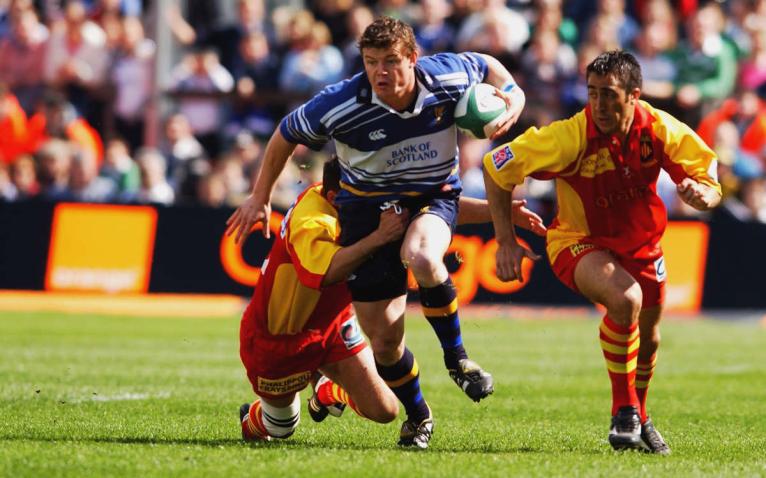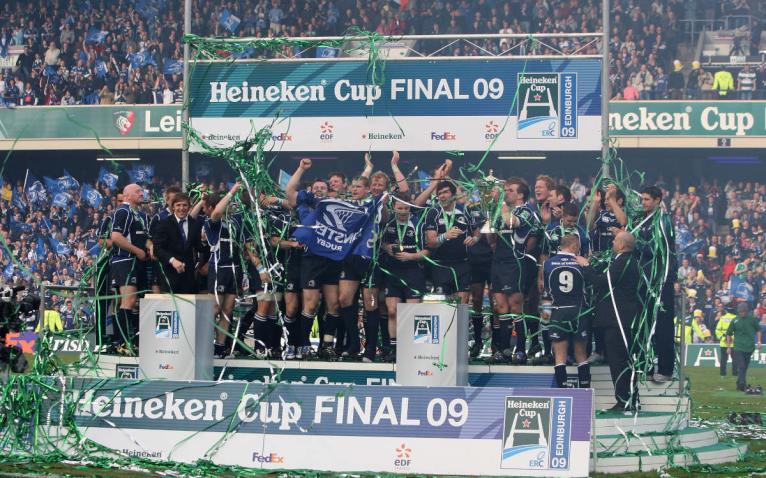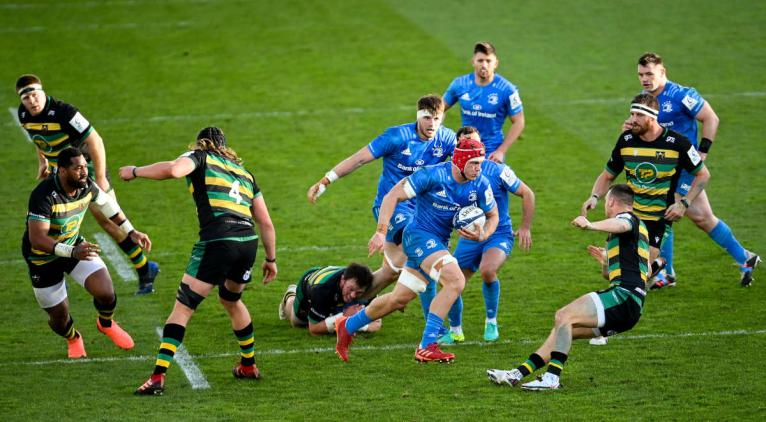In the late summer of 2005, Brian O’Driscoll sat with new Leinster head coach, Michael Cheika and gave it to him straight. He had been with Leinster for six seasons and had one Celtic League winners’ medal to show for it. He was part of a Leinster backline that included Shane Horgan, Denis Hickie, Girvan Dempsey and Gordon D’Arcy but success had eluded them. They had been shocked by Perpignan, at Lansdowne Road, in 2003 to fall one step short of reaching their first ever Heineken Cup Final.
Striving for that next level had seen them burn through four coaches in just over two years. Cheika was tasked with getting Leinster over the hump, but first needed to retain his star player. Simply put, O’Driscoll told him he needed to see real signs of progress, and that this could be a title-winning side, or he would be moving on. Cheika made O’Driscoll captain but was answering questions, weeks into the new season, when the Leinster legend was presented to the Biarritz crowd, ahead of a Top 14 clash with Stade Francais. Canal+ interviewed O’Driscoll at half-time, who explained he was there “on holidays” as he recovered from the shoulder injury that brutally ended his Lions tour. No-one bought it, and O’Driscoll would later admit the appearance was a rocket aimed at the IRFU to get them shifting on contract terms.
Cheika’s shaky start was not aided by league defeats to Ospreys and Munster, and a home Heineken Cup loss to Bath. By the time O’Driscoll returned to the fray, though, they had improved. Cheika and David Knox, a fellow Aussie, did not take long to identify Leinster needed another way to take the fight to teams. “The forwards needed to be given an opportunity to get themselves into the game,” former Leinster hooker Bernard Jackman recalled. “Sometimes as a forward pack, if you are just creating ball, getting ball to the backs… backs… backs…, you don’t really get a chance to get a foot-hold in the game. As the team evolved you saw Leinster creating a driving maul, an attacking scrum. Leinster forwards, getting in and picking and going and really out-working teams. That was important. Maybe the rugby wasn’t as pretty but it was more successful.”

As a former No.8, Cheika understood the focus needed to be on making his pack a force to be reckoned with. Heading into the final months of that 2005/06 season, Leinster were well set. They avenged that European loss against Bath to nip in ahead of Leeds and Stade Francais as eighth seeds for the quarter finals, then travelled to France and stunned Toulouse, 41-35. They were back at Lansdowne Road for another golden opportunity.
For that semi-final, Cheika started Cameron Jowitt, Keith Gleeson and 22-year-old prospect, Jamie Heaslip. Munster met them with Denis Leamy, David Wallace and Anthony Foley. Looking back on that 30-6 trouncing by Munster, years later, former Leinster prop Reggie Corrigan said, “The one thing that stands out from that day was the running out onto the pitch. That was the winning of the game right there. We ran out and it was a sea of red everywhere, and no blue. It was a case of ‘Hold on a second, we’re in Dublin here, what’s happening?’ The Munster supporters were amazing. They got tickets from everywhere and got their colours.”
Rocky Elsom had one of the greatest ever seasons of club rugby in the northern hemisphere – every second match seemed to end with him holding a cut-glass trophy, medal or bottle of bubbly to signify another man-of-the-match effort.
Leinster fell short in the league and Heineken Cup, that season, but O’Driscoll had seen enough to stick around. The board backed the Aussie on two repatriation signings that would add grit, nous and prove crucial – lock Leo Cullen and flanker Shane Jennings. When the Heineken Cup served up a semi-match rematch, three years on, Leinster had learned their lessons. First up, Munster red had been matched by Leinster blue for the big day, at Croke Park. The famous GAA ground was a patch-work of red and blue, but there was no clear advantage. Second, that Leinster back row had a more formidable air to it – Heaslip had grown into a world-class operator, Jennings was the quintessential pain-in-the-arse openside and Rocky Elsom. The Aussie was in the middle of what still stands up as one of the greatest ever seasons of club rugby in the northern hemisphere – every second match seemed to end with him holding a cut-glass trophy, medal or bottle of bubbly to signify another man-of-the-match effort.
The Munster back row Leinster’s trio faced off against were as tough as any side, in that era, could face – Wallace, Leamy and Alan Quinlan. On that April day at Croke Park, though, the Leinster back row dominated. Munster struggled to find a foot-hold in the game, while that Leinster backline started to exploit the gaps after the forwards had slogged the hard yards first. Leinster pulled away in the second half and laid the Munster ghost to rest. Buoyed by that, and with Elsom immense again, they went on to beat Leicester Tigers at Murrayfield to become European champions for the first time.

From 2009 to 2018, Leinster built their own European dynasty as they won four titles. The rock upon which that success was built was the back row. For the past 15 years, Leinster have always been able to field a unit that would be the envy of most rivals. The names meld from one fearsome competitor to the next – Heaslip, Sean O’Brien, Kevin McLaughlin, Jordi Murphy, Scott Fardy, Dan Leavy – and into the current crop.
From the last Leinster side to win the Champions Cup, only Rhys Ruddock and Jack Conan remain as back row options. Will Connors has two starts in the competition, this season. Both against La Rochelle, both involving him cutting their big ball carriers off at the legs and both in winning efforts. In terms of minutes, though, the stage has been left to Ryan Baird (480), Caelan Doris (439) and Josh van der Flier (334).
According to Opta, across this season’s Champions Cup, Leinster’s back row ranks highest for tries per game, dominant tackles, metres gained and attacking rucks hit.
According to Opta, across this season’s Champions Cup, Leinster’s back row ranks highest for tries per game, dominant tackles, metres gained and attacking rucks hit. They are second only to Toulon for line breaks (1.5) per game. Very much like the Irish back row, which Jamie Roberts labelled best in the world, they are so well-rounded. Swap in Ryan Baird for Munster’s Peter O’Mahony, then have Conan and Connors as viable starting options or weapons off the bench. It is enough to make head coaches of Test sides envious, let alone those in charge of clubs.
Diving into the statistics again, Baird, van der Flier and Doris are all over the board. Charting eight key metrics of back row performance, no-one features as frequently as the Leinster men. This is a mere snap-shot of the impacts of the primary Leinster back row in this season’s competition:

Add to that, Leinster’s main back row unit have contributed seven Champions Cup tries, so far, and Baird has also added lineout calling to his armoury, and you have an ant’s nest to plug with a split toothpick.
There was a particular exchange in the quarter final win over La Rochelle that stood out. Such was the ferocity of the Leinster performance, and the clarity of their attacking play, they were 30-13 ahead when 2022 World Rugby Player of the Year, van der Flier came on. He did not take long winning a turnover and his teammates did not take long extinguishing all French hope, rolling in further tries from Dan Sheehan and James Lowe. La Rochelle were desperate to make any sort of dent in the Leinster defence but lost another breakdown battle. As van der Flier celebrated, Will Skelton came in and shoved him away. The Leinster flanker swung around, grinning. Skelton raised an arm in apology, then patted his rival on the shoulder. Both men knew. The race had already been won, and there were still 20 minutes on the clock.
The words of Brian O’Driscoll, reflecting on the 2009 Heineken Cup triumph, ring true for the current Leinster crop. “I’m a big believer that the lows happen for a reason,” he said, “to drive the desire. We got beaten out the gate by Munster (in 2006), it fuelled our desire and we had to rely on that in subsequent games to be able to get yourself up to go the extra yard, push yourself that extra couple of per cent.”

For the current Leinster side, La Rochelle were the ghost they needed to be put to rest. Up next, like in 2009, a confident English outfit lie in wait. Leinster kept their big hitters in reserve while the wider squad headed to South Africa for their United Rugby Championship swing. Their hope will be to hit Northampton with similar fizz that did for La Rochelle. Not for the first time, they will look to their back row to pop the cork.


Welcome to the Pro ranks. Those hard teams of old do hit the sole better though. its a dog fight at the top.
Actually the era defining moment came a few years earlier. February 2002 to be precise, when Michael D Higgins as finance minister at the time introduced his sports persons tax relief bill to the dial. As the politicians of the day stated “It seems to be another daft K Club frolic born in Kildare amongst the well-paid professional jockeys with whom the Minister plays golf” and that the scheme represented “a savage uncaring vision of Ireland and one that should be condemned”.
The irfu and Leinster would be nowhere near the position they are in today without this key component of the finances.
Michael D, bending spoons and seeing around corners again! Getting the big players back to Ireland, too, was key and that tax element certainly helped.
Not a squeek out of Leinster for weeks about this match. So quiet. The first team have been quitely building for this encounter under Nienaber’s direction. All fresh, all highly motivated. They are expecting a season’s best performance from Northhampton. They will match that. They will be fresher and apparently they will have 80,000 out of the 83,000 shouting for them.
I do expect Northhampton to turn up big time. Not to be missed.
On a tangent it is evident how the loss of a few Premiership teams has in some respect helped other Premiership teams and England. More quality over less teams makes the teams better, which has a knock on effect on England. Not the only factor contributing to England’s rise but one of them.